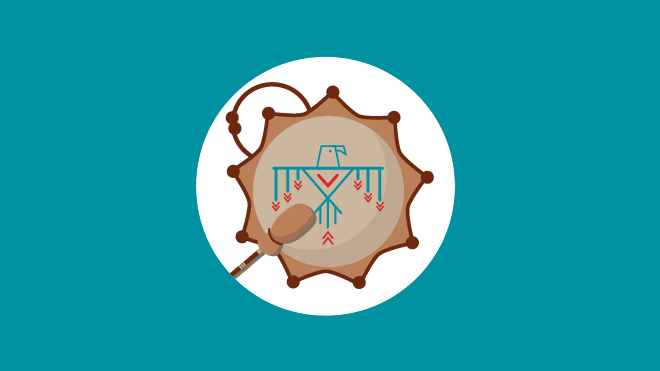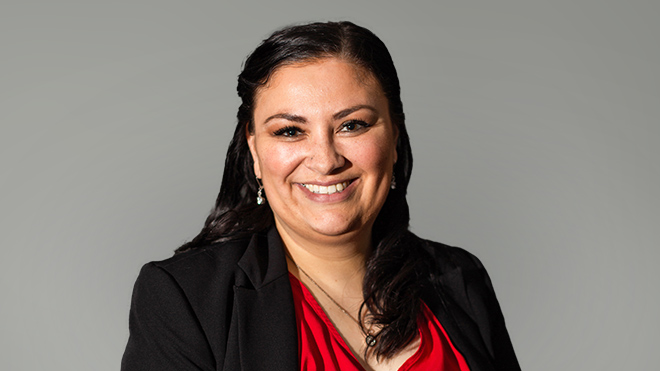
Protecting Elders From Fraud
Like many older people, Native and Indigenous elders in the U.S. are the targets of scams and fraud. Learn what's being done in response.
Working in BECU collections, Saramae H. learned that a member of a local Native American tribe had lost about $15,000 to a "sweetheart scam."
In this common scam, a fraudulent online actor targets lonely singles and pretends to declare true love while slowly draining the victim's checking account. The scammer pretended they knew each other from powwows and the bingo hall.
"We're learning more about how to help community members without making people feel shame or embarrassment because then they're not likely to ask for help," Saramae said.
Saramae is a BECU collections lead in Spokane and is the community engagement specialist for BECU's Native and Indigenous Peoples' Employee Resource Group.
"I see on a regular basis how people's lives can face near-devastation and financial ruin due to one scam or fraud incident," Saramae said. "Which is heartbreaking to watch, as the ability, especially for older folks, to rebuild is nearly nonexistent."
"One event can quickly diminish savings or put housing and financial stability at risk," she said, "or require that others put themselves into uncomfortable or overextended positions to assist elders who have been exploited."
The Risk
Financial exploitation can disrupt economic security. Types of financial abuse and exploitation can include scams, identity theft, property theft, money theft and "confidence crimes" (building trust through manipulation as a means to commit fraud) by close friends and family.
Federal Trade Commission data found that Alaska Native and Indigenous individuals are "more likely to be victims of scams and less likely to report scams than other racial and ethnic groups, which makes them an even more attractive target for con artists."
According to a 2023 report from Justice in Aging, 574 federally recognized tribes have nearly one million U.S. Indigenous and Alaska Native people over 65. Tribal communities vary in history, size, language and cultural practices. The report notes that tribal elders are at risk of not receiving aging-with-dignity services that include housing, health care and financial security.
Older Indigenous people can be at greater risk, as they may feel obligated to share resources with family, and have access to Individual Indian Money Account funds, retirement, Social Security or other dependable income, according to a Native American Elder Justice Initiative report.
Saramae said that, depending on the tribe and treaty, money from tribal business ventures such as casinos, stores and land rental agreements can be sent annually or biannually to tribal members. These routine payments, along with Social Security, pension or other retirement payments, can put older people at risk.
The IRS warns that tribes and nations may be at higher risk of fraud as one of the nation's fastest-growing economic segments.
Traditional Attitudes Toward Native American Elders
Few studies have examined the attitudes of Indigenous people regarding older people, whom they classify as elders. But past research has noted that "traditional values and beliefs instilled from childhood promoted respect toward the elders."
One study discovered that a sample of Canadian Indigenous people demonstrated more positive attitudes toward elders, compared with a sample of white students.
According to the International Association for Indigenous Aging, "In traditional Indian cultures, elders are viewed as possessors of knowledge, history, and spirituality. Throughout Indian country, elders and the values they embody are recognized as both a valuable resource and a legacy to be honored."
The association goes on to note elders' service as both leaders and "memory keepers, holders, and messengers of our traditional values, and as living examples of courage, perseverance, and modesty."
Researching the Problems
To learn more about this vulnerability, a 2023 AARP study (PDF) with 39 Indigenous Americans in the U.S. (including Alaska) found similarities. Many had encountered widespread scams; shared concerns regarding vulnerabilities faced by elders in their communities and preferred local sources for fraud-related consumer education rather than external sources.
Participants said that shame and embarrassment prevented them from sharing experiences with others, as did fear of teasing, judging and stigma. These factors, plus a lack of confidence in legal and banking systems, contribute to underreporting of fraud and scams.
The AARP participants said their native languages do not have words for "scam" or "fraud."
"Words like 'tricking,' 'cheating,' 'lying,' 'stealing,' and 'fake' are typically used instead," according to the report.
Some scams encountered by AARP survey (PDF) participants are those many U.S. residents experience across a range of financial status, ethnic background and age. These scams include:
- Fake lotteries
- Charity scams
- Fake offers to eliminate credit card debt
- Overpayment scams
- Student loan repayment scams
- Identity theft
- IRS impostor scams
- Romance or sweetheart scams
- Impersonator scams
- Property and rental scams
- Business opportunity scams
As with other modes, scammers made contact by voice calls and text messages from spoofed phone numbers appearing to come from the reservation prefix or another local number. They also attempted contact by email and social media, but some were made in person.
Some scams targeted Indigenous communities, such as outsiders pretending to be Indigenous and attempting sales of fraudulent homeopathic products or posing as tribal utility companies demanding payment. Some people may also pretend to be Indigenous to sell fake Indigenous regalia (traditional clothing, accessories and other apparel) or Indigenous art.
Fake and counterfeit sales violate the federal Indian Arts and Crafts Act and threaten the livelihoods of artists and craftspeople, notes the U.S. Department of Interior's Indian Arts and Crafts Board.
Art and craftwork is "an important tool for passing down cultural traditions, traditional knowledge, and artistic skills from one generation to the next," according to Indian Arts and Crafts Board Director Meridith Stanton in a July 2024 press release announcing the prosecution of $1 million in sales of counterfeit Native Alaskan artwork.
Taking Action
AARP participants emphasized the survey participants' great concern for older adults in their community, serving as "caretakers" of their elders and providing guidance regarding scams. Interviewees said elders may be at higher risk without as much technological experience and are more likely to trust others.
Saramae echoed this philosophy: "As young adults, my generation and younger generations are more exposed to the modern world and can help teach elders about internet safety. I explained online banking to my mom and helped her set up her account for safety."
"Indigenous youth also help elders learn more about how retirement funds work and financial protection, as Indigenous subsistence living and multigenerational living go by the wayside, with changes in social structure and population expansion," Saramae said.
Older participants in the AARP survey indicated they would likely turn to their children or other family members for help. One idea offered by Alaska Native participants was to teach younger people about fraud in schools, so they could help advise elders. The report notes that storytelling and narrative could connect cultural traditions and values with proactive prevention and protection measures.
Saramae believes building intergenerational financial security and generational wealth is critical: "When elders are exploited, they need somewhere to land or help with their finances."
Protecting Elders and Yourself From Fraud
AARP survey participants undertook a wide breadth and depth of protective steps:
- Regularly changing passwords
- Using different passwords for every account
- Using two-factor authentication for logins
- Blocking numbers on their mobile phones
- Not answering calls from unrecognized numbers
- Not clicking on links in texts and emails
- Never giving out a Social Security number
- Sharing knowledge of scams on social media to help others
- Researching a company's legitimacy on Google, Reddit and other websites
Participants recommended that this information be disseminated through trusted sources in their communities versus from outsiders, in places such as Facebook, local radio and newsletters, powwows, senior centers and chapter houses.
In 2023, the Consumer Financial Protection Bureau's Office for Older Americans and the Native American Elder Justice Initiative worked together to produce webinars on financial exploitation. Topics included reporting and investigating elder fraud, returning funds to victims, and protecting elders from financial abuse and exploitation.
The report suggested using terms like "disrespect" or "maltreatment" instead of "abuse" when screening for financial exploitation.
Hope for the Future
When a family or community member may be committing financial abuse, restorative justice attempts to resolve underlying issues, repair harm done and prevent future financial fraud according to the NAEJI report (PDF). Approaches include community conferences, sentencing circles, victim-offender mediation, and community reparations.
More than $9 million in Department of Justice Funding was announced in 2020 to combat elder fraud and abuse, with almost $500,000 going to the local Muckleshoot Tribe
More broadly, the U.S. Department of the Interior Indian Arts and Crafts Board also helps investigate and combat fraudulent arts and crafts makers, distributors and salespeople. The office of Indian Tribal Governments takes reports of potentially abusive tax fraud schemes.
BECU has partnered with tribal organizations to offer financial education programming to Indigenous youth, some of whom receive a large lump sum at age 18 or 25, Saramae said. Financial education topics can include using the money for financial growth, safer banking and avoiding scams.
"Realistically, it's more likely that elders will listen to young adults in their own communities due to their existing relationships, so having an impact on youth, they can also help elders," Saramae said, echoing the AARP's research. "We want to offer financial literacy to help them protect themselves online and protect their assets, and help young adults have financial conversations."
"I view this as not only a top priority but also a duty that we all have, no matter your culture or upbringing," Saramae said. "Elders deserve to retire with dignity and respect."
The above article is intended to provide generalized financial information designed to educate a broad segment of the public; it does not give personalized financial, tax, investment, legal, or other business and professional advice. Before taking any action, you should always seek the assistance of a professional who knows your particular situation when making financial, legal, tax, investment, or any other business and professional decisions that affect you and/or your business.


